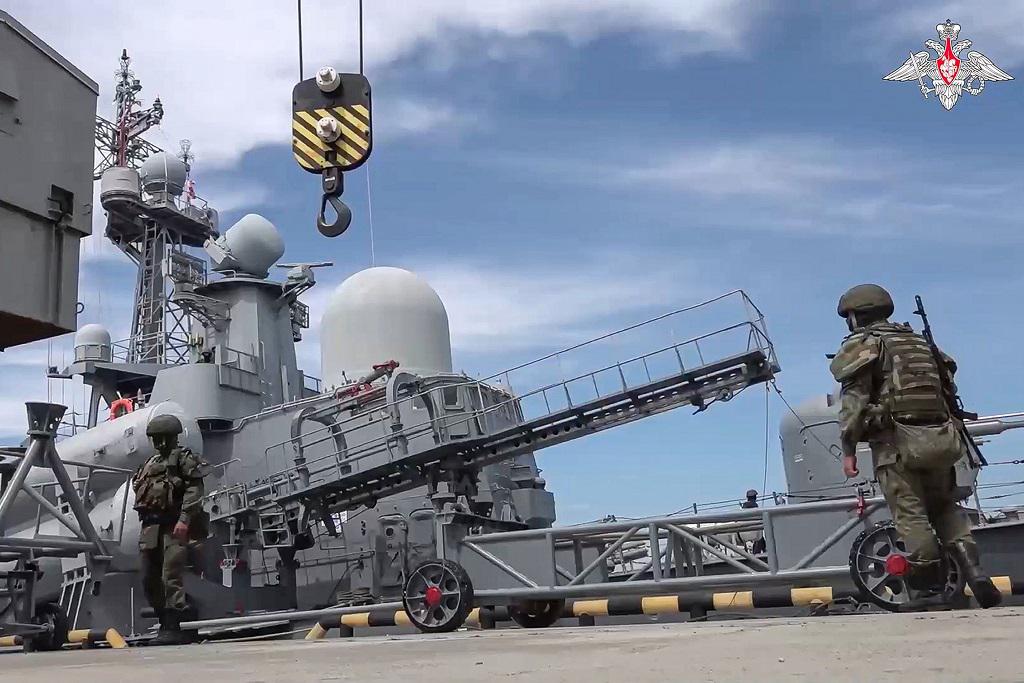World
Everything You Wanted to Know About World War III but Were Afraid to Ask

I’ve wanted to be a historian of the 1960s since I was a young teen, but in college, I started feeling guilty about the ambition: such a small canvass for understanding the world compared to the planet-shattering events of World Wars I and II. Instead, I became the historian and journalist you see before you today, and while I passionately opposed whenever America began yet another ill-conceived semicolonial adventure in some far-off land, I largely shunted off matters military to the margins of my consciousness, both as a citizen and as an intellectual.
Interest in how war actually worked—“tank columns,” “supply lines,” “the Seventh Fleet,” all of that—seemed reserved for dads who watched what we called the “Hitler Channel” (the History Channel, back when it showed history, mostly black-and-white documentaries about the course of World War II), or slightly creepy hobbyists. So when journalists Jason Fields and Matthew Gault first invited me a few years back onto their podcast on military matters, Angry Planet, I suspected they might be that sort of hobbyist.
Well, I was wrong: about them, and about my disinclination to think about the details of war. A realization started creeping up on me, and maybe you, too: Since Russia’s invasion of Ukraine, world war feels relevant again, mutually assured destruction be damned.
My hunch brought me to the foot of my friend Matthew Gault. Growing up, his father worked in Texas’s “Silicon Prairie” for defense companies like Raytheon. After kicking around in retail, he became a self-taught defense intellectual specializing in nuclear weapons, first as a blogger, then for outlets including Reuters, Vice, and The New York Times. I’ve come to appreciate him as one of the best writers and thinkers about war, something progressives have no choice but to understand. Our conversation about that, which happened to take place on September 11, amid a furious debate about whether the U.S. should sell more lethal weapons to Ukraine, is edited for clarity.
But not for harrowing terror.
Rick Perlstein: Recently on your podcast, a guest noted that a think-tanker at the respected Atlantic Council is now arguing that the U.S. might want to use nuclear weapons in the event of a Chinese invasion of Taiwan, and cited another expert saying the world had never been closer to potential nuclear war. For an untutored idiot on security studies like me: Why would Xi Jinping want to risk a war that way? Why, for that matter, would anyone?
Matthew Gault: I don’t think Xi wants to kill a bunch of Americans. But think about things from China’s perspective. You are one of the most powerful economies on the planet, and you are encircled on every side by a country that is half a world away that you know has a thousand times the world-ending weapons that you do. And this other country maintains the most powerful navy the world has ever known, the Seventh Fleet, operating in territory that has been your sphere of influence of thousands of years, but stopped being that at the end of World War II. And America, which I do refer to as an “empire”—I think it’s a different kind of empire than we’ve seen before, but it is an empire—has built and maintained bases, and a largely military force, just outside your borders. If I were China, I would be uncomfortable. I understand where that comes from.
We do live in a world where a land war in Asia feels pretty inconceivable. So what do you do instead to expand your sphere of influence? Build man-made islands off your coast to push areas out of being in international waters. Use vessels that aren’t necessarily military vessels, but fishing vessels, to ram other fishermen in the area and push people out. And be looking at that other country across the strait called Taiwan, a hinge point for one of the most important products that is made on the planet, these silicon chips that power the entire way everyone lives. I would want that country under my power if I was China. It makes rational sense.
So what does Xi want? Xi wants China to be a world power and a world leader, and Xi wants to stay in power and not die like Gaddafi. I think it’s that simple.
You see what happened to Muammar Gaddafi in 2011, followed by a NATO intervention against an alleged plan to commit genocide, as a watershed for these questions.
Two countries willingly gave up their nuclear weapons programs, South Africa and Libya. Not only did Gaddafi die after giving up his nukes, he was pulled out of a drainpipe, sodomized, and shot. The crowd filmed it and put it online. If you’re someone like Putin or Xi, you got a video of the worst-case end for an authoritarian regime. And Gaddafi, for all his many faults, at least attempted to play nice with the West!
You might say “two and a half countries,” given that Ukraine gave up the nuclear weapons on their soil after leaving the USSR.
Excellent point! Look at how that’s worked out.
So what about Europe? In spring, you interviewed Aram Shabanian, who explained that tensions are so high that if America shot down a North Korean missile test, Russia might confuse the interceptors for ICBMs and launch their own nuclear strike. So was he right?
Remember, Aram said that if we got past August, things will be fine. It’s September now. What was the big thing that changed in Ukraine in the last month? Ukraine went on the offensive. They breached Russia. It has been revealed that Russia can’t defend its own borders. How long can Russia continue to last? So those tensions he described in the rest of Europe are no longer quite as operative. Ukraine’s push into Kursk has changed things.
Let’s move to the Middle East. I heard a pretty harrowing account on another podcast that Hezbollah has access to unlimited arms from Iran via Syria and a highly experienced army with fighters more fanatical for martyrdom than Hamas. He suggested that if they succumb to pressure to prove to their constituency of dispossessed Palestinians that they’re the saviors, or if the tit-for-tat exchanges with Israel in Lebanon get out of control, we’ll have a conflagration that makes Gaza look like a picnic.
Right. I think that of all the flashpoints, the Middle East is more concerning. Despite the fact that the last year has been a nightmare, I’ve been shocked at how—stable things have been? There’s part of me that wonders if Iran doesn’t want to go all in because it’s buying time for its nuclear weapons program to be completed. If you’re Iran, it’s perfectly fine to continue to use Hezbollah to poke and prod, and some people are just going to get assassinated along the way. But if you know that in six months, a year, two years you’re going to have nukes, that will change the calculation. Does Israel have nukes? Yes. And how would the nature of the conflict change once Iran essentially has a guarantee that no one is going to invade its sovereign territory? I don’t know. But I think that of all the places where nuclear weapons could be used in the near future, despite all the bluster that I hear out of Russia, it feels like something going bad in the Middle East is where I would see it.
You also talk a lot on the podcast about the big structural stuff that drives wars: the things that make ordinary people desperate enough to be willing to kill in order to achieve their basic human needs. So this is a good transition to the big structural stuff that really creates instability no matter what any individual actor does. The sociological foundations of war. First on my list here is climate change. What’s the big picture on that?
It’s everything that we all know. The planet is getting hotter; areas where people live are going to become uninhabitable; people are going to flee those areas and go to colder climates. It’s going to displace people all over the planet both internally and between nations, and if you think that the political crisis in America over immigration is bad now, just wait until people from where I live in Texas are fleeing inland into the country along with people from Latin America because where they live is uninhabitable.
See, that’s so much easier for my pinhead little left-winger brain to understand than setting armies against each other because some megalomaniac wants to wear a crown: You have something I need to survive, and I am going to seize it by any means necessary. That’s logical!
Yeah. And if you want to see how that’s going to play out, look at America’s southern border. Look at every country around Syria—you get people living in refugee camps in terrible conditions that they can’t leave. I’d be pissed.
What about nuclear weapons themselves?
It is a miracle with as many nuclear accidents and as many moving parts as there are in the world’s nuclear forces that there has not been some sort of accidental war. It only takes one misread, misinterpreted thing for all the bad stuff to kick off. And America, and Russia, and China, are all tripling down on what they call “nuclear modernization,” which is building new and different kinds of nuclear weapons. Everyone’s building more. America is going to spend a trillion dollars over the next 20 years building new missile silos and new nuclear weapons. The DOD is in the process right now of building new cities just to build silos in the Dakotas.
Wait, what?!
Yes. The DOD’s going to come in and build temporary whole cities with a population of a couple thousand people, like a fracking boom thing, just to bring people in to build new silos and make new nukes, bury them, and then leave. That’s going to play out over the next 20 years. That’s a lot of nuclear material, and there’s accidents. Things happen!
Does AI increase the risk?
I am extremely skeptical that AI is or will become part of command-and-control systems—in America. I almost hesitate to share this one anecdote, but the guy I talk to about this, who is very smart and has the connections, said Russia is talking about using large language models to take over portions of the decision-making process, because they are worried that they will have someone in the chain that will say “no.” So they want to automate that.
That’s old wine in new bottles: “Dead Hand” stuff. Can you explain that to my readers?
Well, I would urge them to watch Dr. Strangelove, because it gives a succinct summary. It’s basically the idea, if nukes are coming, in the absence of human input, the nukes would be launched: a “failsafe” trigger would launch the weapons. The USSR developed and deployed it. Russia still has one, but it’s probably turned off. There are similar systems in the U.S., but no one is sure how any of it works. It exists, but they never put it into use. Are other countries like North Korea or China, or maybe Russia now, looking to put some AI decision-maker somewhere in the control chain? Maybe.
The nuclear intellectual Herman Kahn said it was important to “think about the unthinkable.” But maybe it’s a paradox we’ve been thinking about it so long that we know how to think about it. But I have no idea how to think about what a World War III that falls short of nuclear war, but with the ever-present risk of nuclear war, would look like in 2024.
You get a preview of it right now in Ukraine. It’s World War I, but the skies are filled with drones. It’s trench warfare, people very, very slowly trading territory back and forth, and the sky is full of robots.
What about cyber war?
Cyber war is always going on. I’m not just talking about influence campaigns that all the countries are running on each other through Facebook posts or whatever; I’m talking about Stuxnet Russian malware being found in America’s power grid. China stealing things from bank accounts in the U.S. This stuff happens all the time, and is going to be part of any modern conflict going forward, but we tend to focus on that stuff and ignore the parts of war that don’t change: War is about using soldiers to take territory to achieve a political end. You always knock out the power stations before you send in the ground troops. Cyber war may provide a more efficient and less lethal way to do it, but it’s the same thing.
So what is the best we can hope for when it comes to a less violent world where there isn’t a risk of an out-of-control conflagration that doesn’t rely on such colossally wasteful things as building entire cities to build more nuclear silos, or the various ways we turn young people into cannon fodder, or the way we leave behind the rural communities who send the cannon fodder? I know you’ve thought about this. What do you have to say to this audience of liberals and leftists?
Ahhhhh—they’re not going to like it. Accept that war is part of life. Accept that war is part of the human condition.
America has been “at war” basically my entire adult life. We just haven’t called it war. I had friends who were dying in the Middle East. And before that, we were at war in various places big and small across the entire planet. We may have called them “police actions.” Or maybe “drug interdictions,” in Latin America. But it was war.
This stuff—the bad, inexcusable uses of American military power—is not going to change unless the liberal and progressive brain engages with it and understands what is going on. And not from a “we have to end all war, give peace a chance” perspective, but to put themselves in the shoes of a wheat farmer in Bucha. That’s a city in Ukraine that was the site of an early, and so far the worst, mass killings of the war. There were soldiers taking people out and digging mass graves. Holocaust-style stuff. It was horrifying. And this farmer is pressed from a country to his east that has 500 years of history of rolling in and turning his neighborhood into a bloodlands like that.
I think that for a long time—and I think this is by design—the American empire has been very good at putting its populace to sleep, and make it not think of the foreign wars on the other side of the world that it’s been fighting in their name. And we’ve got to plug back in. We have to understand how America uses its empire, and get more educated on the military. Or this will never change. Because we can’t see a way around it. It’s the water that we’re swimming in. You’ve got to see that it’s all around you and really grapple with it.
Are you saying that there will always be global bad actors that without some countervailing power will just roll over wheat farmers all over the place for the hell of it? Does that mean that we as citizens have to individually and collectively decide what level of American-sponsored violence might be required to keep the world safe and stable?
[Sighs] Yes. I think so. Yes. I do. Maybe this is the son of a defense contractor talking. I’ve got very conflicted feelings about how my father put food on the table. But I remember asking him, “Do you feel bad about what you do for a living?” And he said, “No, because there is always going to be violent men with big sticks, and you’ve got to make sure that you guys have got the biggest sticks.” And the older I get, and the more I learn, the more I think that he’s probably right. There’s always going to be a guy like Putin who is going to want to roll over Europe and absorb things, for whatever X, Y, or Z reason. And sometimes you are going to have to fight those people. Sometimes violence is the solution.
America has spent a long time fighting conflicts that are not justified. Wasting the lives of its men and women in ways that were ridiculous and were not needed. And that will not change unless we all start paying attention to what is going on. And unless we draw our own lines.










